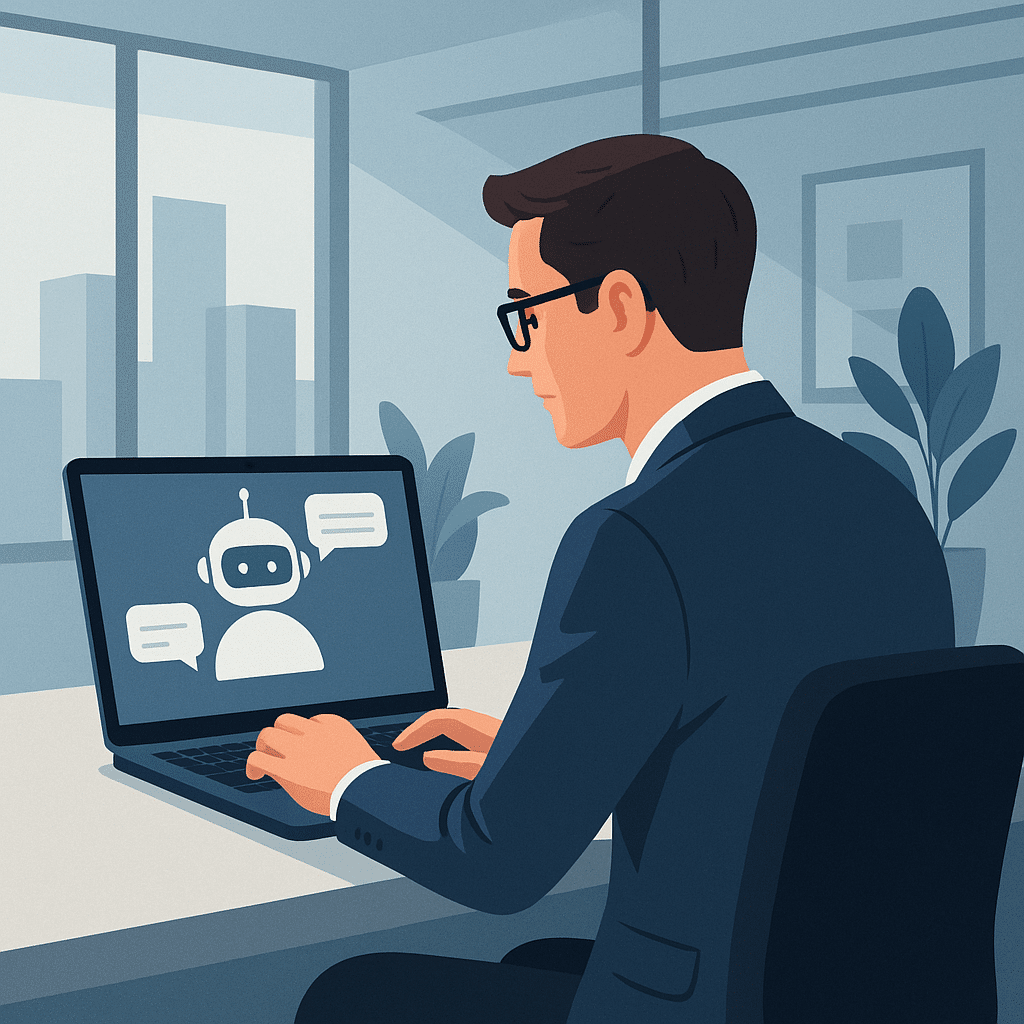The Rise of AI Chatbots: Changing the Face of Business
Introduction: AI chatbots have rapidly risen from novelty to necessity in the business world. These intelligent conversational AI systems act as virtual assistants, handling customer inquiries, providing support, and even automating routine tasks. Today, AI chatbots are embedded in customer service, marketing, and internal operations, demonstrating how artificial intelligence can streamline business processes and improve customer experiences. As companies embrace digital transformation, AI chatbots in business are saving time, cutting costs, and fundamentally changing how organizations interact with customers and employees alike.
AI Chatbots in Customer Service
One of the primary drivers behind the rise of AI chatbots is the need for better customer service. Businesses are deploying customer service AI chatbots on websites, apps, and messaging platforms to assist customers 24/7. Unlike human agents who have limited hours, chatbots can instantly respond to inquiries at any time of day or night. This instant availability has a big impact: in surveys, 64% of people say the best feature of chatbots is 24-hour service availability. With AI chatbots, customers no longer have to wait on hold for simple questions to be answered. These virtual assistants can handle common requests—such as checking an order status or resetting a password—within seconds, freeing human staff to focus on more complex issues.
AI-powered chatbots are also improving the quality of service by providing quick and accurate answers. They are trained to recognize a wide range of questions and fetch information instantly, which leads to higher customer satisfaction. In fact, 69% of consumers say they appreciate chatbots for providing quick replies to simple questions. And since one chatbot can help many people at once, customers don’t end up waiting in line even during busy times. The overall result is a smoother customer experience that builds trust and loyalty to the business.
Automation and Efficiency Gains with Chatbots
AI chatbots bring significant automation and efficiency gains to businesses. By automating repetitive tasks and inquiries, chatbots reduce the workload on human employees. This leads to faster service and cost savings. Analysts estimate that using chatbots can help businesses save up to 30% of customer support costs, which amounts to around $8 billion in savings globally by 2025. Routine processes like answering FAQs, scheduling appointments, or processing basic orders can be handled entirely by chatbot systems. This business automation allows companies to operate more efficiently and scale their support as their customer base grows, without needing to linearly increase staff.
Beyond chatting with customers, AI chatbots can integrate with back-end systems to perform tasks automatically. For example, a chatbot connected to a database can update an order status or schedule an appointment without any human help. Chatbots can even follow up with sales leads or send notifications, doing in seconds what might take humans much longer. Because they operate around the clock without fatigue, chatbots keep business processes running after hours and ensure consistent response times. By taking care of repetitive work, AI chatbots allow employees to focus on higher-level tasks that require human creativity and decision-making.

Challenges and Future Outlook for AI Chatbots
Despite their many benefits, AI chatbots do come with challenges. One issue is that chatbots may struggle with understanding unusual phrasing or complex, multi-part questions. If a customer asks something in a way the chatbot wasn’t trained to recognize, the bot might give an irrelevant answer or fail to respond correctly. This can lead to frustration. To address this, companies must continually train their AI models with real conversational data and ensure a smooth handoff to human agents when a chatbot reaches its limits. Modern chatbot workflows are designed to detect when a user is unhappy or a query is too complex, and then automatically escalate to a human representative at the right time.
Additionally, a chatbot should match the company’s tone and handle customer data securely to maintain trust.
Looking ahead, the future of AI chatbots in business is bright. AI technology is advancing rapidly, making chatbots smarter and more capable each year. In the near future, chatbots will likely handle even more complex tasks that today might require a human—possibly completing entire sales or giving personalized advice. Voice-activated assistants are also on the rise, allowing businesses to interact with customers via spoken conversation (through smart speakers or phone systems). In fact, many experts predict AI assistants will be involved in almost all customer interactions eventually. As chatbot capabilities grow, companies using these tools gain a competitive edge through lower costs, faster service, and around-the-clock availability.
FAQs on AI Chatbots in Business
Q: What exactly are AI chatbots and how do they work?
A: AI chatbots are software programs that use artificial intelligence to simulate human conversation. They use natural language processing to interpret a user’s question and then refer to their knowledge base or databases to respond with the appropriate answer or action.
Q: How do AI chatbots improve customer service for businesses?
A: They provide instant, 24/7 answers so customers can get help anytime without waiting. Because chatbots can handle many questions at once, even peak-time inquiries receive quick responses. By taking care of FAQs and simple requests, chatbots free human agents to focus on complex issues, making overall service faster and more effective.
Q: Can AI chatbots replace human customer service agents entirely?
A: Not entirely. AI chatbots excel at handling straightforward, frequent questions and tasks, but human agents are still needed for complicated or sensitive issues that require empathy or complex decision-making. Businesses use chatbots for routine queries and then transfer customers to human agents when a conversation goes beyond the bot’s capabilities, ensuring a balance of efficiency and personal service.
Q: How else are businesses using AI chatbots besides customer support?
A: Businesses also use AI chatbots beyond support. In sales and marketing, chatbots greet website visitors, answer product questions, and collect leads. In online retail, they help customers find products or track orders, and some handle bookings or reservations via chat. Internally, companies use chatbots to assist employees (for example, IT helpdesk bots or HR bots that answer common workplace questions). In general, any repetitive Q&A or transactional task can be handled by a well-trained chatbot.
Q: How can a company start using an AI chatbot?
A: It begins with identifying where a chatbot could help (such as handling customer support queries or sales inquiries). Then the company chooses a suitable chatbot solution and trains it on relevant data (like common questions and answers). The chatbot is integrated with the company’s systems (so it can access necessary information) and tested on a small scale. After refining its performance, the chatbot can be launched for broader use, with ongoing monitoring and improvements as needed.
Conclusion
AI chatbots have become a game-changer for businesses, providing a scalable and efficient way to engage with customers and automate routine tasks. By leveraging conversational AI, companies can offer instant support and personalized interactions that would be impossible to provide with human staff alone. The rise of AI chatbots in customer service shows how technology can enhance the human touch – customers get quick, helpful answers at any hour, while employees are relieved of tedious inquiries and can concentrate on more complex work.
As we move forward, AI chatbots are poised to play an even larger role in business operations. They will continue to become smarter and more capable, handling an expanding array of tasks across support, sales, and beyond. Businesses that embrace this trend stand to gain significantly in customer satisfaction and operational efficiency. Ultimately, AI chatbots and human teams working together can deliver superior service and drive innovation in how businesses operate, making the future of work more responsive and productive.
Further Reading
- IBM – What is a Chatbot?
A clear overview of AI chatbots, how they work, and their business applications.
👉 ibm.com/topics/chatbots - Gartner – How Chatbots Are Reshaping Customer Experience
Research insights into AI-driven customer support and automation trends.
👉 gartner.com/en/insights/artificial-intelligence/chatbots - Forbes – The Future of AI Chatbots in Business
Analysis on how companies use chatbots for efficiency and engagement.
👉 forbes.com/sites/forbestechcouncil/2023/11/21/the-future-of-ai-chatbots-in-business - Zendesk – Guide to AI Chatbots for Customer Service
Practical breakdown of chatbot benefits, setup, and customer support improvements.
👉 zendesk.com/blog/chatbots - MIT Technology Review – How AI Chatbots Are Evolving
In-depth discussion of new chatbot capabilities and ethical concerns.
👉 technologyreview.com
